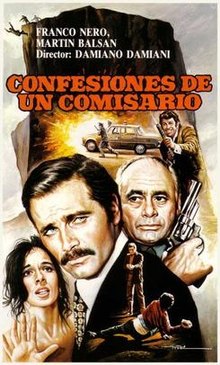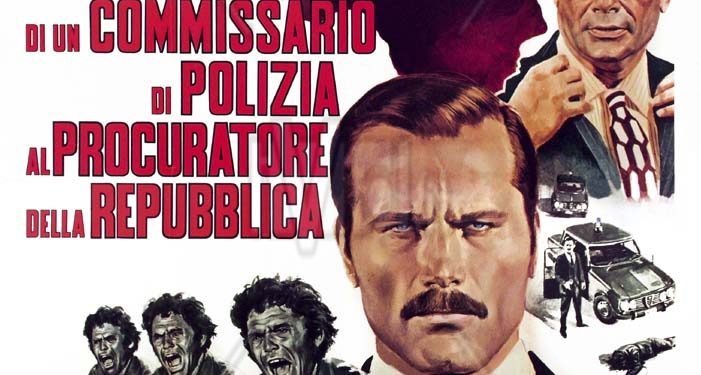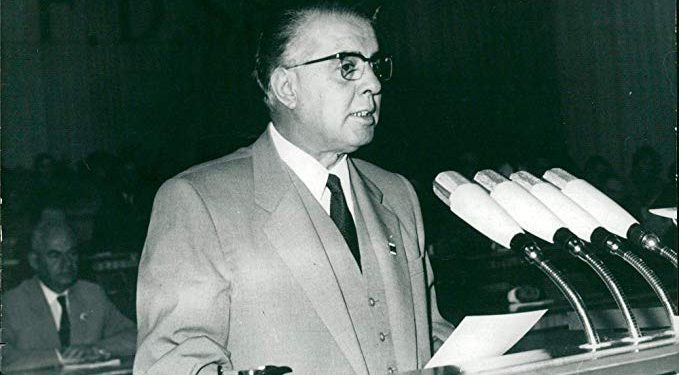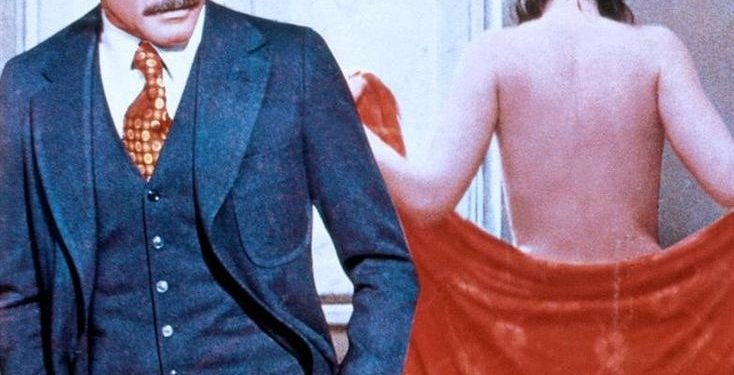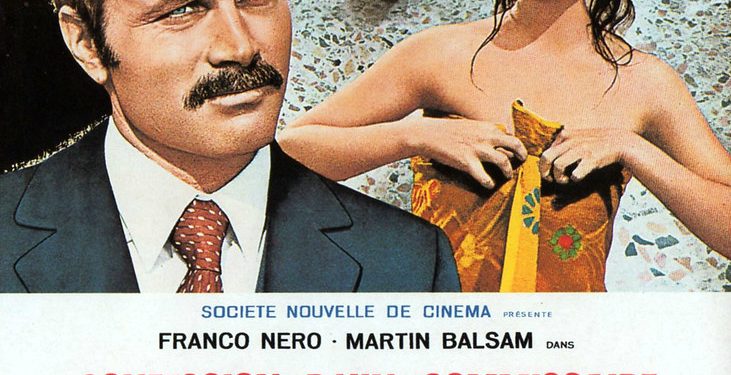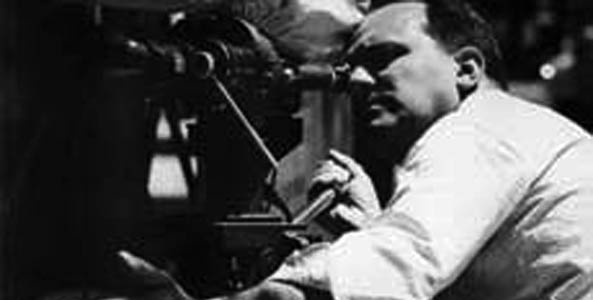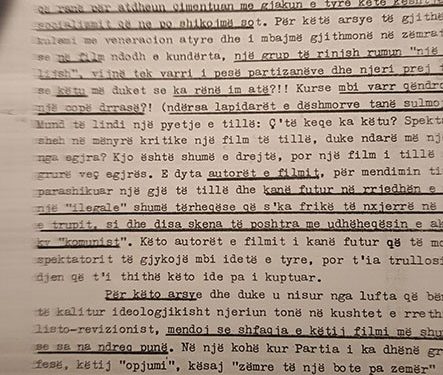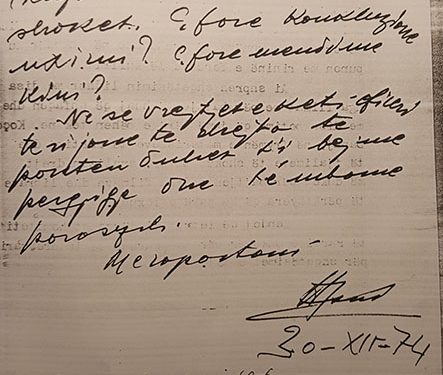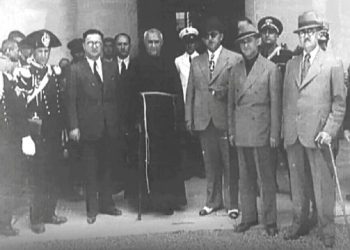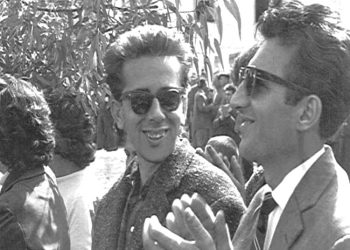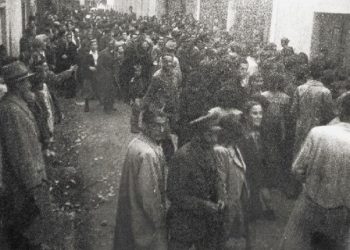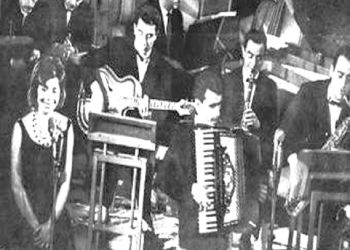Memorie.al publishes secret documents of 1974 with correspondence between the Central Committee of the SPL signed by Hysni Kapo, Pirro Kondi and the personal secretary of Enver Hoxha, Haxhi Kroi, with the Party Committee of the district of Shkodra, regarding the letter border officer, Koco Danaj, sent to the Enver cabinet, demanding that foreign films be banned and removed, such as “Confessions of a Police Commissioner” and “The Most Beautiful Woman” of the famous Italian director, Damiano Damiani, and some books like…
The generation of Albanians who were in their early teens remembers very well the breakdown of ticket counters and movie theaters around the country when foreign films were shown. those of the famous Italian director Damiano Damiani, “The Most Beautiful Woman” (La moglie piu bella) starred by actress Ornela Muti, (then 14) in the role of Francesca Chimarosa and Alessio Orano in the role of Vito Juvara, or ” Confessions of a Police Commissioner ”, with the lead role played by the great Franco Nero, (and in other roles, Martin Balzam and Marik Toro), films that made a huge fuss and were received with great interest by the art-loving public Albanian even for the fact that at the center of the film was the Italian mafia of that time. But the brilliance of these films did not last long and faded away, as suddenly there by the end of 1974, as if by magic, they disappeared forever from circulation to never appear in Albanian cinemas, where, along with the sport, they were almost the only entertainment or more precisely the little “frills” from which the outside world could barely be seen from that isolated reality and the closure in which the high Communist leadership headed by Enver Hoxha had entered the country.
Although in the ensuing years the world-famous Italian director Damiano Damiani would still be a “guest” in communist Albania with the film “La Piovra” starring the extraordinary actor Mikele Placido in his films ” The Most Beautiful Woman “and” Confessions of a Police Commissioner “would remain a beautiful memory of the past, and the portraits of actors Ornela Muti, Alesio Orano, Franco Nero, etc would not be easily erased in the memory of the youth of that time… But what happened to these films and why did they not appear in Albanian cinemas where the “ritual” with foreign and Italian films continued ?! The truth of this, namely the banning of two Damian films that were once shining with its mastery in starving Europe for Italian cinema, no one knows to this day, as almost everyone who made the decision to ban those films has been separated from this life for years.
But fortunately, the only witness who is still alive is exactly the character who became the trigger, or more precisely the one who “disappeared” those two films from circulation, and with them the Romanian film “Saint Theresa and the Devils”, (by famous director Serju Nicolaescu, played by Hungarian minority actress Reka Nagi), TV series, Czechoslovak production, “Captain Klos”, (original title, “Higher Price than Life” ), as well as some “yellow” books such as “Yellow Dog” (by George Simeon), etc. He is Koco Danaj, originally from Tepelena, a well-known public figure since the 1990s as a publicist and researcher, but also of the political environment as the leader of a small party that served in 1974 as an officer for the Border ( youth secretary), at the Shkodra Branch of Internal Affairs, and at the same time a member of the Central Committee of the Albanian Youth Labor Union, sent a letter to Haxhi Kroi, the secretary of Enver Hoxha, requesting the prohibition of the above-mentioned films and books… Graduated that year from the Faculty of Philology of the University of Tirana, a connoisseur of several foreign languages and with an enviable cultural background and luggage (mainly for his knowledge of world literature and cinematography), but also indoctrinated abroad mass, in his letter sent to the cabinet of Enver Hoxha, Koco Danaj, has analyzed in detail why those films and books had no place in Socialist Albania. So, above all, it seems that it was not only the communist regime with the relevant propaganda institutions that “blindfolded four” in order not to “infiltrate foreign ideology” in Socialist Albania, but also “vigilant guards” made individual individuals, as in the case in question, which did not have that functional function. And as a result, it seems that the letter of the new officer, Danaj, was “in place” at the time, as the films and books he “suggested” were banned, not only removed from circulation but some institutions that had them independence, like Kinostudio “New Albania”, “Naim Frashëri” Publishing House of Albanian Radio and Television had many problems because they had allowed or put them into circulation. Not only that, but the letter of the new Border Officer was so “thin” that it embarrassed even the senior leadership of the then APL, such as Hysni Kapon, Piro Kondi, etc., that did not know how, where and what answer to give him as its author ?! Interestingly, why that letter from Enver Hoxha’s cabinet was not sent to Ramiz Alia for “review” covering art, culture, and propaganda, but to Hysni Kapos, who covered the organs of the “Dictatorship of the Proletariat” ?! Concerning these and other, he knows the letters in question which is published in full and for the first time on the pages of this book and also exclusively for Memorie.al.
follows from the previous number
LETTER OF KOCHO DANAJ TO THE SECRETARY OF ENVER, HAXHI CROW
“The Yellow Dog” is a novel by George Simeon known in the bourgeois world as the author of police novels, but also touches on social themes. Regarding the picture of this author, the author’s attitude of the novel’s preface contradicts the attitude of another foreign author. Dimitri Joiçi’s book Dissemination and Degeneration in Titian Yugoslavia state that the expression of the degeneration of Yugoslav culture and literature is, among other things, the translation of the works of Boulevard writer George Simeon. If you read the novel in the film “Confessions of a Police Commissioner”, it’s totally fake. These figures of “servants of the bourgeoisie” can exist only in the imagination of the authors, but in no way in the reality of that society. This commissar Megre and Bonavia, according to the authors, do us very good, the first imprisoning three bourgeois businessmen to rescue a poor sailor, while the second arrives and kills his master, the mighty tycoon Lomuno.
How vague is the figure of Commissioner Megre, in which Simeon seeks to reassure us of the “democratic” character of the Burmese order, another foreign film tells us, and precisely the film “The Sabiel Affair”, in which to cover Sabiel’s killings, various state mechanisms put everything at their disposal, and when a police commissar tried to detect the killing, he immediately disappeared. And this is natural: the bourgeois dictatorship cannot leave in its organs people who do not serve it fanatically. So is the movie “Confessions of a Police Commissioner”, which ends when it looks like “Listen to people, don’t raise your head and don’t protest your wailing state because the Mafia makes you black.” To pay off the debt, the director goes on stage and a worker who allegedly protests and eventually dies, but who has nothing in common with the proletarian, is a surrogate. The macabre and similar scenes, in my opinion, the authors of the film have unintentionally put, they wanted to show the strength and power that the darkest reactionary Italian forces take on top of which the Almirante bandit stands.
These were some of the foreign products given to our spectator and for the above reasons bring more harm than good. I say this based on all the appreciation that the Party and Comrade Enver make to our enemies, and especially the material on the savage imperialist-revisionist siege. Speaking of this wild and real siege, Comrade Enver points out his purpose and danger, as well as the tasks that our people face to face it.
First Comrade Enver points out that; The party has struggled with the struggle against bourgeois-revisionist influences … “always as one of the fundamental conditions for the continuous development of the revolution and the building of socialism … also as a necessary condition for its very existence and development as a Marxist-Leninist party”…
Secondly, Comrade Enver sharply strikes at the thoughts and concepts that enemies have nothing to do with us, that we are immune from foreign appearances, and so on. “… Under the current conditions of siege and all-out imperialist-revisionist pressure we are far from thinking we are immune to the dangers.”
Third, Comrade Enver also gives the characteristics of today’s ideological diversion, its main feature. “The characteristics of today’s ideological diversion of bourgeoisie and revisionism against socialism is the unification on a single front of the fundamental counterrevolutionary currents, from genuine bourgeois ideologies of overt anti-communist character to the old traditional opportunism, from modern revisionists to today’s so-called opportunist leftist currents … ” Fourth, Comrade Enver also points to the true purpose of revisionist bourgeois art and culture, demonstrating their fallacy on claims of not recognizing “social prejudice and ideological commitment”. This purpose is ”… to turn the common man into a passive consumer of poisonous bourgeois ideas and make this consumption a habitual need. From this culture, we not only know the masses and the youth, but we must cast it down with contempt and fight it firmly.
Fifth, Comrade Enver also points out the delicate character of the appreciation of foreign culture and art, the risk of falling into xenophobia or xenomania. “… All this emphasizes Comrade Enver requires a mature work on our part mature and scalable, requires the removal of extremist attitudes based on xenomania or xenophobia, liberalism or sectarianism, a lack of critical attitude or being within …”
Sixth, Comrade Enver also gives a valuable message to combat foreign embryo shows. He states that “… our healthy society is disturbed and must always be disturbed by such phenomena, even if they are very few because we struggle to maintain the clean and healthy conscience and moral image of every man, keep our whole socialist society clean…. ”
Seventh, Comrade Enver also gives the classic definition of the bourgeois-revisionist way of life, whose typical manifestations are rampant individualism and selfishness, emptiness and vanity, the pursuit of luxury and the fulfillment of all whims, depravity, and degeneration, parasitism and criminality. that have become the incurable moral and social scars of today’s capitalist-revisionist society. ”
Drawing from these precious lessons of Comrade Enver, I think that Kinostudio and Television, when releasing foreign films, sometimes forget our leader’s message that says; “… .We must always consider every step we take if it serves and how much it serves to educate and educate our people, to repair or disrupt what the Party was building every day, every hour …”
Likewise, the friends of the Naim Frasheri Publishing House with some foreign liberal publications again forget Comrade Enver’s message of what they should translate from world literature. “We have to choose – says Enver – those authors and those books that are the most progressive, the most revolutionary and of the revolutionary moments.” But forgetting this message, they in some cases prioritize the material side of the plan, not seeing their damage in the ideological realm. My opinion is that the screening of some films and the translation of some foreign books serve the enemy more than we do, with these happening just as our party says at night to scale what we build by day.
I may not be entirely right in assessing these foreign products, the poison there may be scarce, yet the party teaches us to worry about the least to keep our socialist society clean. Then when we have such clear instructions why take the film, despite its ideas, and give it to the spectator as spiritual nourishment? Do we thus disrupt the work of the Party, its struggle to withstand the imperialist-revisionist siege? In my opinion, we break them down.
The party has made it clear to us that the siege period is an extraordinary one. Drawing from this party lesson, it is concluded that even the demands of people on themselves and on work must be extraordinary, the caution not to penetrate any poison “pill” is also extraordinary. This precious Party teaching, the institutions mentioned above sometimes underestimate or misunderstand.
These were, Comrade Haxhi, the problems that I thought I would put into this letter and tried to look at them with the eye of the Party and Marxism-Leninism, but I do not know whether I am right about these matters. So I would ask you if the party can explain to me about these problems, am I with these thoughts that I have about the aforementioned works completely on the Party line or my opinions are wrong.
Koço Danaj
Department of Internal Affairs
Shkoder
NOTE HYSNI KAPO FOR PIRO KONDI FOR THE PAPER
Comrade Piro
Look at this letter carefully, talk to friends, what conclusions do you draw? What are your thoughts?
If this young officer’s remarks are fair, at least we should answer them and heed them.
Report me
30.XII.1974 Hysni Kapo
NOTE OF THE ENVIRONMENTAL SECRETARY, HAXHI KROI, FOR THE PAPER
The author of this letter, Koco Danaj, who sends me as a friend of Enver’s secretary is a young Tepelena from a good family. She is a member of the Central Youth Committee who graduated from the Faculty of Philosophy last year. He is now an officer in the internal affairs body in Shkodra where he works with the youth of the Border Force. He expresses concern about some of the foreign-made films being screened and some of the editions that have been made and made to us. Koco Danaj, in the spirit of Party materials and Comrade Enver’s speeches, analyzes the content of some of the translated films and books he has read before.
I think that the letter will be sent to the Party Committee in Shkodra to clarify the person concerned about his concerns.
27.XII.1974 Haxhi Kroi
PIRO KONDI LETTER TO HYSNI KAPO FOR THE PAPER
Comrade Hysni
The problems he raises in his paper Koco Danaj for some films and literary works are just. The works were re-studied and once again, so we delayed our response. Cinema Studios and Television have thoroughly reviewed the entire film fund. The works in question on paper were looked at and especially. With regard to the films in question, measures have been taken: “St. Theresa and the Devil”, “The Most Beautiful Woman” and the Czech television film in question have been removed from circulation. The film “Confessions of a Police Commissioner” has some limitations, but it also has to expose values. Kinostudio’s friends are making some cuts and will accompany it on a critical note, then thinking of releasing it again.
The book “Police Commissioner” also has conceptual errors and should not be translated.
To inform the author of the letter, as he works in Shkodra, we called the Party Committee of that district to call him, thank him for his interest, and tell him that his remarks were fair and that measures were taken. Comrade Sotir Kamberi called him.
Tirana, 14.4.1975 Pirro Kondi
Memorie.al




